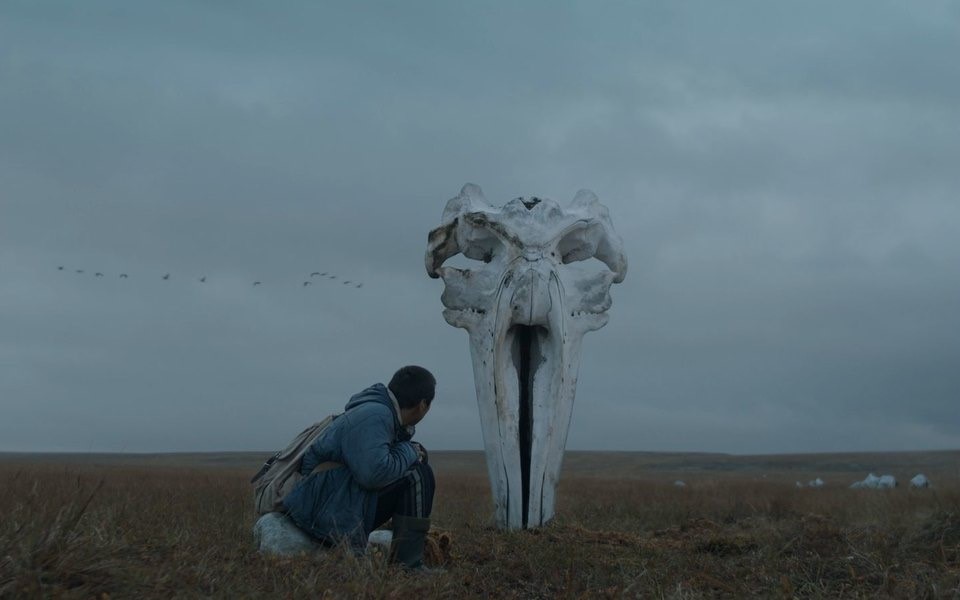To skin a quote from The Social Network, it’s probably better to be accused of necrophilia these days than to be accused of whaling. Less so in the world of The Whaler Boy—a new Russian film tantalizingly set in that vast nation’s furthest reaches—wherein a young lad contends with the hormones and boredoms of rural life while casting longing looks to the West (which sits, in this case, just 50 miles East). The subject of his longings is an American Camgirl with the handle HollySweet999. Oh, to be young and feel love’s keen sting.
The Whaler Boy is the first feature of Philipp Yuryev, a 30-year-old filmmaker from Moscow, which lies some 4000 miles West of this film’s alien landscape. The location is a real doozy, especially for anyone who, in some quiet moment, glanced to that spot on the dateline where Alaska and Russia almost touch and wondered how many souls had attempted the hop over. The film stars Vladimir Onokhov as Leshka, a teenage boy in a tiny village where the men hunt whales; the women have mostly left; and the Internet has just arrived. Yuryev’s bravura opening shot takes us seamlessly, via laptop screen, from the Camgirl’s bedroom (she’s played by Cristina Asmus) to the shed where Leshka and his fellow villagers stand watching. The men shuffle out but Leshka remains, agog. (Whaler) boy meets (cam) girl.
Yuryev shot on location, which DPs Mikhail Khursevich and Yakov Mironichev capture with admirable bombast and sweep. The Whaler Boy suggests this is life on the edge, yet the sense of an outsider looking in is unmistakable—at best voyeuristic, at worst fetishising. This is not the careful, respectful immersion of someone like Chloe Zhao, nor does it intend to be, though I’d love to see what she would have done with the script. Yuryev’s instinct, perhaps born of a background in marketing, is to aestheticize, all shock and awe. The film features seemingly real scenes of whale-hunting that are about as problematic as they are astonishing to witness: an audacious drone shot of a beached kill, its blood spiralling back with the tide; later a sequence of the hunt itself, shot onboard at speed and complete with hand-thrown harpoons, like something out of Mad Max.
Paradoxically, it all has little to say about the community that lives off this grisly occupation, even less about the ecological collateral. The Whaler Boy is more of an artistic statement of intent for Yuryev, the coming together of an aesthetic sensibility: on one hand a background in slick, cinematically literate advertisements (his “Duster” ad for Renault, for one, owes a clear debt to Malick); on the other a handful of finely crafted shorts, little vignettes that showcase his eye for machismo and rugged landscapes. Whaler Boy brings those elements together and playfully douses them in surrealism and laddish film-school cinephilia—a geriatric Kaurismäki rock band here, a Lynchian dance sequence there. The soundtrack of Roy Orbison and mid-Century Americana, along with use of Julee Cruise’s “Rockin’ Back Inside My Heart” as the film’s leitmotif, only underscore Lynch’s presence here. In the opening brothel shot, Yuryev has the camera creep drunkenly forward as if we were watching a Gaspar Noé.
All that flare and stealthy humor give the familiar sense of a young director attempting to flex every creative muscle at once. Seldom is this advised, yet it’s nothing if not thrilling to watch. Whaler Boy is an uneven and somewhat callous film—Leshka’s relationship with his grandfather (Nikolay Tatato) lends some pathos, but the boy’s queasy obsessions will ultimately trouble the stomach far more than the heart. It does, however, have that priceless quality of letting you know how it might feel to be there: what it could be like to stand in shallow water as a chain of balloon-sized intestines wash back and forth at your feet. Or, in the film’s best and most bracingly Tumanesque sequence, what it might be like to rev up an outboard motor and head out for the edge of the world.
The Whaler Boy opened this year’s Thessaloniki International Film Festival.

